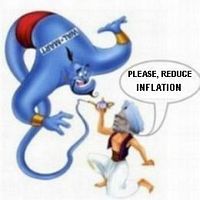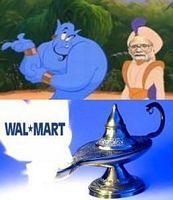FDI in Retail – finally, bulldoze
So finally, riding roughshod over legitimate objections of millions of stakeholders, the Government has formalized its pre-determined decision to open up FDI in Multibrand Retail (FDI in Sell-anything Retail) allowing FDI up to 51% by global players. It has simultaneously removed the restriction of 51% on FDI in single-brand retail and allowed it up to 100% where half a decade after it was first opened up, the benefit to the overall development objective has been zero. (see here and here )
The desperation, determination and insensitivity of the government to push through this so-called “reform” are simply hard to fathom, when it has major issues of failure in governance and economic management to tackle on a more urgent basis. It is but natural that doubts would be raised about the ‘motive’ for this reckless surrender to diktats of some invisible driving force unless it is assumed that government simply wants to create one more diversion or that it has a death wish.
True to its record over the last 6 years, the government has persisted with disinformation and misleading the people and presenting fanciful benefits from FDI in Sell-anything Retail, trying to convert myths into realities by unconvincing advertisements and press conferences. During a press conference the day after the Cabinet decision was taken brushing aside objections within the Cabinet itself, the Commerce Minister, Anand Sharma said:"FDI policy has been evolved after consulting all stakeholders", failing to mention that in consulting stakeholders, contrary views were ignored. In particular, the findings of the Parliamentary Committee representing the collective wisdom of parliamentarians which rejected in 2009 the need for FDI in Retail were also ignored. (see here)
Every misleading argument proposed by the Government over six years as also the larger issue related to international trade policy, has been dealt with in earlier articles in PRAJATANTRA and also in an exhaustive note to the DIPP of the Ministry of Commerce ( see A. B, C, D, E ) )in response to its mock survey with a manipulative questionnaire, conducted in July 2010 which bears careful reading. Incidentally, the majority of the responses to the survey objected to FDI in Retail, a fact which was conveniently glossed over.
The Government has kept on repeating glib arguments pushed to it by the interested parties, and it is worthwhile once again to place the issue in perspective and also to try and correct some misconceived notions which many lay and not-so-lay persons have in this matter. Bluntly put, the entire effort and hard lobbying, formal and informal, by the vested interests to sell their idea has been nothing short of a classic Hustle. The manner in which the government has been gulping down their stories can be crudely compared to a housewife parting with her possessions to a conman promising to double them or similar con games. The vested interests and government have been saying that huge benefits will accrue as a result of and by implication only as a result of FDI in Retail. They are cleverly presented as “likely to..” accrue, in the nature of “forward looking statements” which Walmart and other corporates routinely make to escape any responsibility for assurances not coming true. Once the global retailers have set up their base, nothing can be done if these benefits are not realized; presuming that any kind of monitoring is at all done. This is the same with a Government making tall promises and then failing to realize them.

To have a proper perspective it is first necessary to know the type of brute power the global retailers enjoy in their business. Walmart had net sales of $ 405 billion in 2010 with 8,400 stores in 15 countries. For such huge sales, they engage a mere 2 million (twenty lacs) employees (called associates). The sales of this single player in 2010 were already close to the estimated $450 billion total retail market of India after 10 years in 2020!! Then there are Carrefour ($134 bn.), Tesco ($ 106 billion) and others. Truth be told, all the global players are merely seeking markets and profits in the markets they enter, and are not in the business of performing tasks for the government.

Employment generation?
The Commerce Minister claimed that FDI in multibrand Retail will generate 10 million jobs (when?) of which 6 million will be in logistics sector alone. It is a different matter that the Cabinet Background material claims 1.5m. for front-end and 1.7m. for the back-end retail operation over 5 years, with “millions of jobs” indirectly in the supply chain. This contradiction apart, it flies in the face of practices of the global players e.g. for sales 40 % higher than India’s entire retail market, Walmart has merely 2 m. employees. The other more serious fallacies are two. First, the Minister says that the retail market will grow by 13% “as a result of the new policy” an absurd assertion! It is totally false to suggest that FDI in Retail will actually significantly grow the demand which is determined by other factors mainly the overall economic growth and rising incomes. The retail market will continue to grow and so will employment generation in the retail end as also related logistics areas even without FDI in Retail unless the government expects that global retailers would generate sales by encouraging wasteful consumption habits including by huge imports. It is simply wrong to attribute job creation to FDI in Retail. On the other hand, what is clear that for every job that might be created in FDI outlets, many more will be lost as experience elsewhere, including the USA, has shown and as common-sense suggests. The employment loss due to displacement in the pure domestic sector due to entry of FDI has been deliberately hidden away. Even if we ignore the fact that as FDI retail assumes dominance, many more opportunities for self employment in small retail will be prevented, the inevitable displacement is a cause of great concern as those self employed persons engaged at present in the small retail end may not have the wherewithal to find alternative forms of employment nor do they have a safety net as in other developed countries. When the government says that FDI will be allowed only in a limited number of cities and so others need not worry, it admits that the problem is valid. Besides, it is no comfort to those losing their livelihoods in places where they will be allowed and also in other parts of the country as an indirect fall-out. Even as the government does not seem to have any concern for the small retailers, as it happens, even the US President Obama has begun encouraging the US public to buy from the local small shop!
Other countries
The background paper cites specific countries where FDI in Retail is permitted which is fallacious because each country may take a decision within the overall context of its own situation and what is good for one country need not be good for another. Secondly, if some countries might have benefitted, others have not. As to Brazil, at least one study found no evidence of FDI playing a role in sector growth.( see here ) Russia had been a centralized economy where all sectors including retail were largely under government ownership till 1997 and practically till 2002 before globalization began in 2003. It is not possible to equate the situation in the Russian Retail sector with that of India where essentially, retail has been a private enterprise. As to China, although some liberalization of retail sector had taken place earlier, it opened up the sector really in 2004 to comply with its WTO obligations. Although the Background note cites figures of large retail expansion, there is simply no way that it can be attributed to FDI in Retail, ignoring the huge economic growth, the real engine. Further, by the time China opened up it already had a massive manufacturing base which not only could meet the needs of its own market but also export. It had also some large domestic retailers. Since then, it has become a powerhouse and manufacturing base for the entire world and India stands nowhere in comparison with China’s capabilities in manufacturing as well as its own indigenous organized retail sector.

Bringing down inflation and supply chain efficiencies?
The previous article has discussed in detail how the government is presenting bogus and preposterous assertions that inflation will fall due to FDI in Retail to hide its own failure, due to default or design, in controlling inflation. The argument of improving supply chain efficiencies by FDI in Retail is also a result of complete failure of its previous policy and efforts to reform and transform the supply chain. It has totally failed in doing anything worthwhile to push aggressively to create components of strong supply chains. Let alone cold storage facility for which it has allowed 100% FDI since long, even today it is not fulfilling its primary responsibility of creating storage facility for its own procurement, allowing hundreds of thousands of tons of food to rot. Nor have any significant food processing capacities been built up which would be an important way of preventing loss of product. What is now apparent is that whenever the government fails to reform any aspect of governance, it finds it expedient to simply open up that sector for foreign investment in the guise of “reform”. For everything that cannot be handled, call the foreigners to the rescue.
This apart, it is not certain at all that any dramatic improvement in overall supply chain efficiency can happen purely because of FDI in Retail, even if the retailer somehow invests the required sums in loosely defined “back-end infrastructure”, which essentially would be for his own needs.

Farmer will get higher prices?
This again is a misleading claim to support which, the Background paper cites various figures of total loss due to inadequate infrastructure. The losses of this magnitude have always been there and have been known. Like all infrastructure, this is also an area where the government has failed to create adequate capacities, as mentioned before. If any investment does take place at the hands of the global retailers, it will only meet a fraction of the total needs for facilities, but the Background paper carefully presents the figures to imply that FDI in Retail will be a panacea to solve the huge problem.
As to the farmer getting higher prices, experience in other countries suggests that this may not happen. The factors affecting farmer price realization are many and there is no reason to believe that the global retailers, after making such large investments, will simply be charitable to the farmers and pay them high prices. Even the Background paper says that APMC Act is an impediment to the farmers getting higher prices. If any changes in that Act are made due to which farmers get higher prices, it can not be attributed to FDI. And although cold storage facilities are a distinct business activity which has to be justified on its own economics, the Background paper has quite cleverly tried to link it to the front end retail: “In the absence of FDI in front-end Retail, investment flows into this sector have been insignificant.” The fact is that creating storage capacities which involves easily available technology and expertise has not found interest amongst either domestic or foreign investors as a business proposition, not because there is no FDI in front end retail
The Unique Indian Signature
To make a show that the global players are not going to have a smooth walk-in, the government has stipulated certain conditions which it claims give an Indian character to the policy. These are merely meant to placate and fool those who oppose the move. In fact, the condition of having stores only in larger cities is exactly what the global retailers want at this stage. In the first place, none of these conditions are impossible to fulfill or with some ingenuity, work around. Fulfillment of the condition of 30% sourcing from small enterprises is nearly impossible to monitor. Secondly, as is the case with most regulations with the “Indian” signature, they can and will be relaxed in a short time. A day after the policy announcement, an executive connected with an existing global retailer partnership stated that the conditions are not onerous and can be relaxed. And finally, if any condition is not fulfilled, there is precious little that can be done in practical terms without following a lengthy “due process”. In any case, there is no way that in practice, a business once established would be asked to shut up shop for violation of any of the prescribed conditions. Mention needs to be made specifically of the conditions requiring 30% sourcing from small and medium enterprises. True to character, although the background paper mentions it, when a Cabinet minister made a specific query his attention was not drawn to the fact that the sourcing could be done from anywhere in the world, when the condition is supposed to protect domestic manufacturers. In the initial stages, the government was considering to prescribe a condition for a minimum store space. This condition mysteriously finds no place probably because Walmart have now decided in USA to open small shops ( see here )– a decision which could also be extended to India.
To what lengths will they go
The senior most minister in the Government, while trying to convince his colleagues in the Cabinet meeting, reportedly went to the extent of saying that if FDI in Retail is not approved, Sensex will fall 400 points.( see here )
Such level of desperation and the nature of threat is unheard of. Was the Minister trying to give a message to others to fall in line, knowing that many may have significant interest in what happens to Sensex? Or what could have prompted such an extraordinary remark in a Cabinet discussion? The same minister is also reported to have virtually asked an objecting minister from an ally to shut up.


What they ignore
It is inevitable that smaller indigenous retailers will be displaced in a big way. The government, while grudgingly admitting to the possibility has tried to be totally patronizing by suggesting that they can buy products to sell in their shops from the cash-and-carry global retailers at discount! New as well as existing retailers would find it extremely difficult to get retail space in view of unequal competition from the global retailers for acquiring space. It may be asked by some whether the same effects on employment etc. would not be felt as the competition from domestic organized retail has been increasing. Yes, that can happen and the smaller retailers would have to face the situation as it arises. Domestic organized retailers have a legitimate right to grow as long as the smaller retailers are not discriminated against. In a liberalized economy, retailers large or small will have to co-exist and make the best of their strengths. The issue, however, is that the government has no obligation or need to invite and IMPOSE competition from outside for which there is no justification. It would be unfair to suggest that traders who are benefitting now are the ones who object because the problem is not confined to a few traders. Contrary to scurrilous propaganda, it is not organized retail per se which is objected to, because it has come to stay, but foreign investment and its entry in a sector which calls for no such impending need nor related to overriding national interest. The global retailers will sell not only farm produce but any and all kinds of consumer products, majority being branded, packaged and price-marked products from oragnised manufacturers which do not require any specialisd inputs from the retailers other than shelf space. And in whether they buy (brute bargaining power) or sell, their avowed objective is "to leverage our scale" and they are deeply steeped in the American model of cut-throat competition and gaining market share at any cost. They should not be expected to be kind to competition or even to their domestic suppliers including farmers. Incidentally, this same government has been all along singing the tune of the need for Organised Retail to grow and transform the retail sector. If that was its sincere belief, it should have allowed enough time for them to grow. Now, ironically, even as domestic Organised Retail sector is finding its feet, the government is imposing external competition which will certainly also affect growth of domestic Organised Retail, not only small retailers. This shows that the song of Organised Retail was just a subterfuge and the real intention all along was to bring in the global players.
What the government has failed to acknowledge is that not only will the global players inevitably result in displacement of domestic small retailers; there would be a potentially serious threat to the manufacturing sector for consumer products. The entry of global retailers will provide an excellent entry point for the major world manufacturers notably China without any effort on their part. The global retailers with their enormous financial power and purchasing capacity procure huge quantities already from the Chinese suppliers for their global outlets. Those in India who predict that our manufacturers can withstand competition with Chinese consumer products sold through the global retailers, have, perhaps, inadequate appreciation of the Chinese threat. The imports of consumer products from China have been increasing year to year even with the unorganized imports by relatively small importers and domestic small and medium manufacturers are finding it difficult to compete. When the same products are imported in an organized manner by the global retailers using their huge buying strength, imports will grow in depth as well as breadth and many more manufacturers will face serious difficulties. More important, India does not have as yet a manufacturing base as large as that of China which would be needed to meet the growing demand in India and new manufacturing capacities need to be built up on a large scale. The growing Chinese imports will affect establishment of fresh manufacturing capacities with cheap imports getting more entrenched. Imports of produce from all over the world, particularly fresh fruit, will also increase significantly. This is a problem which exists already and will be exacerbated.

Others airing homilies
Then there are arm chair dreamers with exaggerated notions of India’s superiority, bravado or naiveté with little idea of ground realities that ask: for a country wanting to be super power, why should we object to FDI in Retail? It is an idle and absurd question. Well, is allowing FDI in Retail an indicator of being a super power by any yardstick? Far from being near a superpower status, India is way down in the world order by any number of parameters of human development, health, education, poverty, scientific, technological and industrial development, infrastructure, quality of governance, corruption, etc. and whether FDI in Retail is allowed or not will not affect its status one way or the other. In fact, if we need to seek foreign help and crutches in every sector including retail to set our things in order, it is a sure indicator that we are not fit to be a super power.
Those who compare FDI in Retail with the introduction of computer technology or liberalisation of automobile licensing make irrelevant comparisons as FDI in Retail does not bring any revolutionary technology (computers) or bring manufacturing capacity for new products for which India does not have technology (automobiles).
Then again, there are those who say that consumers need choices and FDI in Retail will give choices. What choices? The Indian consumer today who can afford to ask for “choice” has a wide choice of products to buy to the extent of confusion in what to buy. And more and more products are already coming in the market every day. Choices come from products manufactured, the retailers do not manufacture things; they procure and sell. Also, competition is growing not only for products but there is already a choice as to from which retailer to buy. Those who brand all small retailers as cheats have the freedom to buy from their malls. Those who ask for more choice, forget that even with a benchmark Rs 32 per day, 80% of the people are still poor and the only choices they have is whether to have rice and daal twice a day or once or to go hungry. Those who ask for more choice from foreign retailers because they can afford to spend may do well to spare a thought for the self employed retailers who eke out a living now and who may lose their means of livelihood.
The Underdog - Forever?
Despite the knowledge that India is the second largest potential market and every foreign major who is constantly seeking markets for its products would go to great lengths and be prepared to pay the price to secure a foothold in this market, the government continues to pay scant attention to the enormous bargaining power the country has while opening up the market to outsiders. In Trade related matters (or even larger issues) it continues to act as the underdog (forget being a superpower) and demonstrate a servile approach. This is best demonstrated in its relaxation of policy for single-brand retail. It says, in justification: “Globally, single brand retail follow a business model of 100% ownership and global majors have been reluctant to establish their presence in a restrictive policy environment”. So, 100% FDI should be allowed! Well, what makes the government so desperate to invite single-brand retail by relaxing its existing policy? Does single-brand retailing meet any nationally accepted objective? In any case, the positive effect of existing single-brand retailers has been zero. There are thousands of single brand retailers in the world. Even while being aware of the potential for the Indian market if they chose not to come unless 100% retail is allowed, it is no loss to the country. If they chose to stay away, so be it. Is the country going to miss out that such meek servility needs to be shown? No.
The same approach is evident even in FDI in multibrand retail. It is clear that by showing illusory benefits from their presence, those who have been desperate to enter the lucrative market have successfully managed to convince the government that it is they who would be doing the country a favour by entering the market. They are now being allowed free entry into the huge market without any cost, other than what they have to invest to run their show. Nor is there any evidence to show that the country has managed to build any negotiating strength on the global trade policy front by opening up (which cannot be reversed) without any significant gains. Along with the global retailers, even China would get a free run.
This is India, the super-power.


15 Comments:
Explicit information narrated in great detail for the common man to understand...great work mate.
With the advent of FDI into the retail market, an inevitable suicide, rather murder of the indigenous market is ensured. The bona fide intention of bringing in haste this policy beats and baffles the common man. Except for the CONGRESS, again split there too, none seem to be too keen to introduce this at this point in time. Therefore the moot point is as to whom initiated this and for whose benefit. Am I sensing that there is something clandestine and pertinent to 10JP behind this knee jerk enthusiasm from the boot licking quarters amongst Congress? Well, cannot undermine that angle of thought too.
In short, determined destruction of India, our BharatMata is on the cards with renewed vigor. FDI is one of the elements contributing to it.
Thanks for the enlightening post. JAI HIND!
@prashanthkpp
We have to understand the FDI hoopla in bare thread. Two points about FDI are most important :-
1. Since 1991, India's growth story has largely been financed by FDI. Most of so called FDI is Indian Black Money coming back thru Participatory Note route via Mauritius. 87% of it.
2. UPA's rush for FDI in Retail is a desperate attempt to allow huge chunks of Black Money to come back to India for safe & prosperous investing, before the Black Money trail gets hot due to Opposition, public outcry and largely due to now Subramaniun Swamy getting after Black Money in the most effective way thru ACACI. He has submitted a complaint for FIR with CBI on 28-Nov and aiming at getting Letter of Rogatory thru Courts before looping up all Secret Banking locations around the world.
Study what Walmart+Bharti is doing in Punjab. It's good! It's in farmers' and consumers interest.
Btw, Big Bazaar hasn't shut down the local shops. Nor will Walmart.
FDI IN RETAIL IS NOT A RELEVANT ISSUE AT ALL FOR THE iDIAN ECONOMY. iT IS IMMATERIAL WHETHER 51% FOREIGN-OWNED iNDIAN COMPANIES WILL BRING IN GREAT INVESTMENT INTO iNDIA OR create any large employment or reduce prices significantly. Whether politicians argue for or against these poosible consequences of 51% FDI in multi-brabd retail is irrelevant. The same is true of those who argue that such FDI will hurt small traders, dupe farmers and ultimately cheat consumers - these are equally foolish arguments. These arguments on both sides are for school children to practice writing essays to develop their skills. The fundamental point is that if 25% FDI in multi-brand retail is ok, there is no reason why 51% is going to be so hurting to India? How bif Wall Mart is of no relevance. Wall Mart in USA serves an economy of US 14 trillion dollars - India ia njust about US 1 trillion dollars. Id Reliance Fresh, Spencers, Big Bazars, Ana Bazars,McDonald, Subway, Diominos have so far been in a small operation in India after so many years, what is a great attraction of India to Wall Mart, except a challange in a difficult low income market with great infrastructural constarints.! So, the entire debate is pointless and resource time wasting excercise for Indians.. MUch ado about nothing. But if Wall mart does indeed happen to come to India, both Indian retailers and common people will have an opportunity to learn something valuable that their politicians and elite intellectuals will never be able to teach. Some intellectauls and politicians in India say what is the great technology that has to be borrowed from the West: the cosy fat frogs in the well of course do not know what goes on in the seas.
nice
comments from mr basudeb sen are his own views and out of line with logic and actual experience elsewhere.
fully agree with author that govt. is simply trying to get the likes of walmart in by presenting fictitious benefits.
Now we are getting good Watches,TVs' and so many things. There is constructive competition.Let Wal Mart and others too come sothat we will get correct quantities of Provisions,which will be packed and weighed upto every grams. We will get non adulterated foods.We will get coconut oil without palm oil.Farmers will get good prices for their produce.They will bring modern storage fecilities.So no wastage.No Tax evasion. They will pay taxes without resistence .Officers can enter into their premises without fear.Jobs of packers,accountants,desk attendants,security,managers and many indirect jobs
it is true that fdi is not needed in retail.
govt should focus on what it is supposed to do to set things right rather than ask foreigners who will exploit our market for all time to come with no advantage to country.they will take away our wealth in terms of profits, dividends etc. while depriving our own retailers of opportunities to earn from our own market. its not nationalistic approach. the decision is primarily to benefit outsiders get an entry.
pl see
http://bit.ly/c298WZ
http://bit.ly/alodJF
http://bit.ly/csoS4P
http://bit.ly/ccc1QW
FDI in retail in India will change the country entirely. What would be the later implications no one can tell. Of course, the government is saying all good things about it but given the fact that India is such a vast country, I doubt its success. Even though they would do well, I don't understand why should we let the money go out of India and why not keep the money rolling in India and make India a better place. FDI means the foreign companies will rob us off our money and take it back to their country? How does it differ from the East India Company?
Divya Bhaskar
MyGrahak.com
pics are so funny....and very informative.....good job...!!
More branding of goods is in offing and people will have more choices but at a price which will be very high and the real manufacturer in India will not get the volume margins as the import at cheap price will happen and China will be the beneficiary as all the big brands like walmart, tesco etc source the goods from china as the labour cost is quite cheap. It is all hapenning world. We have to live with it. Yours is a very good effort this way you keep abreast with the fast changing world.
Is there any better way to sell the country?
how to kill the small merchants of india is FDI in retail.These fellows have swallowed huge amount from FDI getting it deposited in foreign banks to liquidate India.The PM is a shakuni if you understandit well and have understoofd Maha bharata.
Great Article!!!
Nice post, i hope everyone will like your post..
Post a Comment
<< HOME